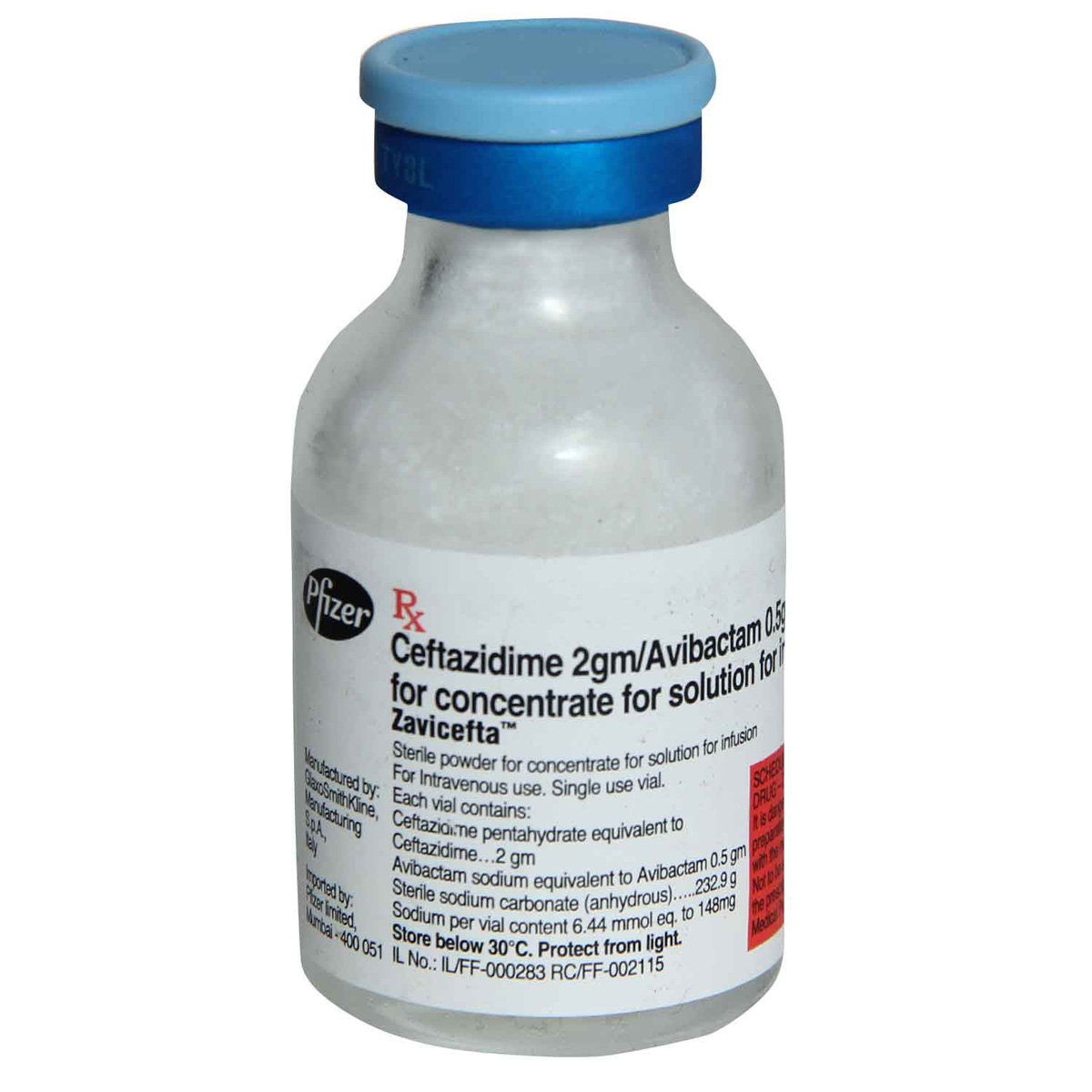- Home
- Zeftabac Injection
Zeftabac Injection Substitute
Zeftabac Injection Substitute
Medicine Composition:
AVIBACTAM-0.5GM+CEFTAZIDIME-2GMAll Substitutes & Brand Comparisons
RX
Out of StockNot for online saleInfegam 2 gm/0.5 gm Injection 1's
Biocon Ltd
₹1499
(₹1499.0 per unit)
60% CHEAPERRX
Not for online saleZilias Injection 1's
Intas Pharmaceuticals Ltd
₹2700
(₹2214.0 per unit)
41% CHEAPERRX
Not for online saleZivictam Injection 1's
Converge Biotech Pvt Ltd
₹4564.5
(₹3742.9 per unit)
1% CHEAPERRX
Out of StockNot for online saleZavialfa Infusion 1's
Alniche Life Sciences Pvt Ltd
₹4921.5
(₹4035.6 per unit)
6% COSTLIERRX
Not for online saleZycefta Injection 1's
Zydus Healthcare Ltd
₹5163.5
(₹4234.1 per unit)
11% COSTLIERRX
Not for online saleForzid-AV Injection 1's
United Biotech Pvt Ltd
₹5414
(₹4439.5 per unit)
16% COSTLIERRX
Not for online saleAvictum 2.5 gm Injection 1's
AAA Pharma Trade Pvt Ltd
₹5612
(₹4601.8 per unit)
20% COSTLIERRX
Out of StockNot for online saleAkavicef Injection 1's
Akumentis Healthcare Ltd
₹5650
(₹4633.0 per unit)
21% COSTLIERRX
Not for online saleZavicefta Injection 1's
Pfizer Ltd
₹5678.5
(₹4656.4 per unit)
22% COSTLIER

When Should You Consider Switching from Zeftabac Injection?
Patients may explore substitutes in the following scenarios:
- High monthly cost of Zeftabac Injection
- Non-availability in local pharmacies
- Generic recommendation by a doctor
- Side effects or better tolerability with alternatives
What to Know Before Switching
Before you switch from Zeftabac Injection to another medicine, here are some important points to keep in mind:
Same salt, different brands:
Most substitutes contain the same active ingredient - AVIBACTAM-0.5GM+CEFTAZIDIME-2GM, but the fillers, coating, or manufacturing quality may vary slightly.
Consult your doctor first:
Even if the salt is the same, your doctor can confirm if the substitute is right for your condition, dosage, and health history.
Watch out for allergies or reactions:
Some people may react differently to certain brands due to inactive ingredients. If you notice any side effects, inform your doctor immediately.
Price ≠ effectiveness:
A lower-priced substitute doesn't mean it's less effective. Many generic medicines work just as well as branded ones.
Check the dosage form and strength:
Always match the substitute’s strength (e.g., 5mg, 10mg) and form (tablet, capsule, syrup) with what your doctor prescribed.
Uses
Medicinal Benefits
Zeftabac Injection contains Ceftazidime and Avibactam; they act against both aerobic (grow in the presence of oxygen) and anaerobic (grow in the absence of oxygen) gram-negative and gram-positive bacteria. It is used in the treatment of bacterial infections of the urinary tract, respiratory tract, and abdomen. Ceftazidime inhibits enzymes that regulate the formation of the bacterial cell wall, thereby arresting bacterial development. Avibactam is a beta-lactamase inhibitor. Beta-lactamase is an enzyme that inactivates antibiotics and builds up a drug resistance. By inhibiting beta-lactamase, avibactam makes the bacteria more susceptible to antibiotic action. Zeftabac Injection damages the bacterial cell wall, kills bacteria and makes the bacteria more sensitive to the action of the antibiotic. Hence Zeftabac Injection finds widespread use in treating complicated bacterial infections.
FAQs
The substitutes of Zeftabac Injection contain the same active salt(s) - AVIBACTAM-0.5GM+CEFTAZIDIME-2GM. However, they may differ in price, manufacturing quality, and inactive ingredients. Speak to your doctor to find a suitable option.
Switching to a generic substitute medicine in the place of Zeftabac Injection is often possible if it has the same salt, strength, and dosage form. But always check with your doctor before making any changes to your medication.
Generics versions of Zeftabac Injection are typically more affordable because they don’t include the original brand's research, development, and marketing costs. They contain the same active ingredient and are approved for safety and effectiveness.
Most people don’t notice any difference. However, some may react to different fillers or coatings. If you notice any unusual symptoms after switching, consult your doctor.
Make sure the new medicine has the same active salt, strength, dosage form. Always confirm the change with your doctor or pharmacist.
Substitutes of Zeftabac Injection meet the same safety and efficacy standards as Zeftabac Injection, but small differences in absorption or formulation can exist. A doctor can help you choose the right one for your needs.
Yes. Substitutes of Zeftabac Injection may vary in color, size, or shape due to differences in manufacturing and branding, but this does not affect how they work.
Yes, it’s generally safe to switch between multiple substitutes of Zeftabac Injection if they have the same salt and strength. However, always inform your doctor so they can monitor how your body responds.
Yes, many people safely use substitutes of Zeftabac Injection for long-term treatment. Just ensure it’s done under medical supervision.
If your symptoms stay under control or lab results remain stable, the substitute for Zeftabac Injection is likely working well. Regular follow-ups with your doctor are important.
Absolutely. Even with the same salt, small differences can affect how your body responds when switching from Zeftabac Injection to its substitute. Always consult your doctor before switching.
Buy best Infections & Infestation products by
Cipla Ltd
Macleods Pharmaceuticals Ltd
Alkem Laboratories Ltd
Lupin Ltd
Abbott India Ltd
Sun Pharmaceutical Industries Ltd
Mankind Pharma Pvt Ltd
Micro Labs Ltd
Aristo Pharmaceuticals Pvt Ltd
FDC Ltd
Intas Pharmaceuticals Ltd
Glenmark Pharmaceuticals Ltd
Ipca Laboratories Ltd
Torrent Pharmaceuticals Ltd
Zydus Healthcare Ltd
Biochem Pharmaceutical Industries Ltd
Zuventus Healthcare Ltd
United Biotech Pvt Ltd
Hetero Drugs Ltd
Emcure Pharmaceuticals Ltd
Alembic Pharmaceuticals Ltd
Indoco Remedies Ltd
Fusion Health Care Pvt Ltd
Dr Reddy's Laboratories Ltd
Leeford Healthcare Ltd
Cadila Healthcare Ltd
Wockhardt Ltd
Zydus Cadila
GlaxoSmithKline Pharmaceuticals Ltd
Morepen Laboratories Ltd
Blue Cross Laboratories Pvt Ltd
Cadila Pharmaceuticals Ltd
Converge Biotech Pvt Ltd
Elder Pharmaceuticals Ltd
Hetero Healthcare Pvt Ltd
Pfizer Ltd
AAA Pharma Trade Pvt Ltd
Gufic Bioscience Ltd
Mylan Pharmaceuticals Pvt Ltd
Corona Remedies Pvt Ltd
Wallace Pharmaceuticals Pvt Ltd
Apex Laboratories Pvt Ltd
Medishri Healthcare Pvt Ltd
Akumentis Healthcare Ltd
Alniche Life Sciences Pvt Ltd
Hegde & Hegde Pharmaceutica Llp
Veritaz Healthcare Ltd
Ranbaxy Laboratories Ltd
Koye Pharmaceuticals Pvt Ltd
Shreya Life Sciences Pvt Ltd
Overseas Health Care Pvt Ltd
Biocon Ltd
Indchemie Health Specialities Pvt Ltd
Medley Pharmaceuticals Ltd
Brinton Pharmaceuticals Ltd
J B Chemicals & Pharmaceuticals Ltd
Unifaith Biotech Pvt Ltd
Ajanta Pharma Ltd
Biochemix Health Care Pvt Ltd
Natco Pharma Ltd
Samarth Life Sciences Pvt Ltd
Unichem International
Laborate Pharmaceuticals India Ltd
Unipark Biotech Pvt Ltd
Zymes Bioscience Pvt Ltd
Indiabulls Pharmaceuticals Pvt Ltd
Neon Laboratories Ltd
Vasu Organics Pvt Ltd
DR Johns Lab Pharma Pvt Ltd
East West Pharma India Pvt Ltd
La Renon Healthcare Pvt Ltd
Medgen Drugs And Laboratories Pvt Ltd
Novartis India Ltd
Canixa Life Sciences Pvt Ltd
Icarus Health Care Pvt Ltd
Lincoln Pharmaceuticals Ltd
Celon Laboratories Pvt Ltd
Concept Pharmaceuticals Ltd
Klm Laboratories Pvt Ltd
Nicholas Piramal India Ltd
Systopic Laboratories Pvt Ltd
Yuventis Pharmaceuticals
Capital Pharma
German Remedies Ltd
Pristine Pearl Pharma Pvt Ltd
Unison Pharmaceuticals Pvt Ltd
Aurz Pharmaceutical Pvt Ltd
Clover Health Care Pharma
Kepler Healthcare Pvt Ltd
Allites Life Sciences Pvt Ltd
Auspharma Pvt Ltd
Intra Life Pvt Ltd
Jolly Healthcare
Linux Laboratories Pvt Ltd
Ozone Pharmaceuticals Ltd
Cachet Pharmaceuticals Pvt Ltd
Comed Chemicals Ltd
Delcure Life Sciences Ltd
Fresenius Kabi India Pvt Ltd
Khandelwal Laboratories Pvt Ltd




